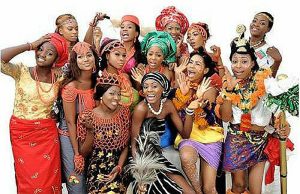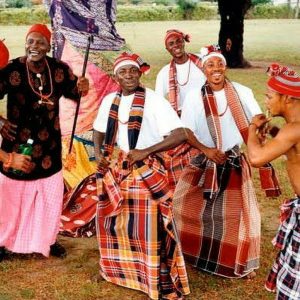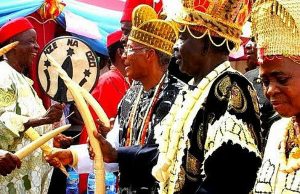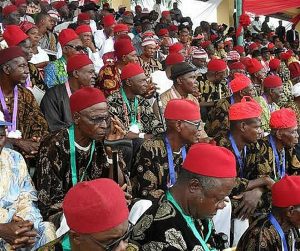History and Origin Of The Igbo Tribe: The Igbo people call Igboland, which occupies much of Southeast Nigeria, home. The Niger River divides this region into the eastern region, which is the biggest, and the midwestern region, which are not equal in size. However, the river has not served as a barrier to cultural cohesion; rather, it has offered a simple means of communication in a region where numerous settlements claim various origins. In addition, other tribes surround the Igbos on all sides.

There has been much conjecture over the Igbo people’s ancestry, and only in the past fifty years has any substantial research into this issue been done. They are eager to learn their history and recreate how they got to be the way they are, just like any other group of people. Their experiences both during and after Nigeria’s independence from colonialism have highlighted for them the truth of their collective identity, which they aim to enshrine in verifiable history.
Recommended: Pre-colonial Administration of The Igbo Society
The Origin of the Igbo Tribe
The Igbo people’s origins are a mystery and a source of greater debate than those of any other ethnic group in Nigeria and maybe all of Africa. There are several interpretations of Igbo origin, making it exceedingly difficult, if not impossible, to determine which is the most accurate or acceptable.

Igbo have no historical identification with a founding father or founding home, and many versions claimed a different source, which even made the Igbo origin more mystical. This is in contrast to the Yoruba, who trace their origin to Oduduwa in Ile-Ife, and the Hausa, who also trace their origin to Bayajidda in Daura. Although it is true that most ethnic groups in Nigeria have many historical origins, the Igbo ethnic group, which dominates the eastern section of the country, has a far more mystical origin story than any other.
The Igbo people are well renowned for their segmentary or acephalous manner of life, according to research. This is because they haven’t had centralized nations from the beginning of time. As a result, they ran a form of monarchless government.
It has also been determined that the Igbo people are mostly farmers and traders. Despite considerable cultural variation within the group, it has been determined that the Igbo people share a core cultural heritage in their language, which includes a variety of dialects that are mutually comprehensible. They also have a similar political structure centered on the transfer of power and control by those who hold the staff of authority, known as the Ofo.
According to certain sources, the Igbo can be divided into five subcultures:
1. The Igbo of the eastern Nigeria
2. The Igbo of the South-eastern Nigeria
3. The Igbo of the North-eastern Nigeria
4. The Western Igbo and
5. The Northern Igbo
Recommended: Countries With The Weakest Military in the World
Regardless of where a group fits into one of the aforementioned five categories, they are unquestionably Igbo and would be treated as such. Since there are so many conflicting accounts of Igbo origin, as was already said, it is exceedingly challenging to determine which has received the most support.

However, let’s quickly review some of the most popular variants.
The Nri Version
According to tradition, the supernatural being Eri was sent from heaven to start civilization, and it is said that the Igbo people are derived from him. According to the Bible, Gad, who was the father of Eri, was one of Jacob’s sons through his concubine.
According to folklore, Eri served as the head priest of Egypt during Joseph’s rule. When he saw that his people would soon be sold into slavery, he escaped Egypt through the Nile, the Benue, and the Niger, and made his way to a location close to the confluence. He established himself there with the help of the individuals he was able to gather. There was a boy there named Nri by Eri.
Nri was chosen as his heir since he shared his priestly ordination and, thus, his spiritual abilities. Eri eventually gave birth to one girl and four more males. As Nri grew older, he parted ways with his father to start a life on his own. Currently, Nri is located in Nigeria’s Anambra state. It’s interesting to note that the Nri and Aguleri people are at odds on where the Igbos came from. Aguleri, according to one school of thinking, was Eri’s first child to leave Egypt with him. Since Aguleri was born in Egypt rather than the new colony, according to one school of thought, he shouldn’t be the original root of the Igbo race. This school maintains that Nri was the one who inherited his father Eri’s priestly temperament.
Despite these reasoning, it is customary for only an Aguleri man to crack a kolanut if he is present. A king must also travel to Aguleri for a rite and stay there for seven days to gather blessings before being crowned.
After Eri’s passing, his first son Agulu—now known as Agulu + Eri, or “Aguleri“—took control of the territory, and the populace increased and spread to create other settlements. When Nri learned of his father’s passing, he returned to Aguleri and lived there for a considerable amount of time, making it one of his final desires to be laid to rest there.
Some claim that he built a kingdom before he passed away as a result of inheriting his father’s supernatural talents.

Recommended: Differences Between British and American English
The Israeli Version
One of the most well-liked interpretations of the Igbo people’s migration legends of origin has been identified as the Israeli version. The Igbo language can be traced back to Israel, according to the Israeli version. This presumption is based on the supposed parallels between ancient Hebrew and Igbo cultures.
Some Igbo academics believe that they are descended from the lost Hebrew tribes who moved south. You should keep in mind that the Igbo people have traditionally been noted for being acephalous.
Benin Version
Onitsha and Delta Igbo, who live on the other side of the River Niger, claim to be descendants of the Benin people. At addition, there weren’t many historians working professionally in that era. Over the majority of Igbo land, there were no equivalents of an oba, an alaafin, or a palace. Because of this, it is very challenging to bring all these contradictory versions together.
Igbos have a number of conflicting versions of their historical origin, as opposed to Yorubas, who live alongside Igbos in southern Nigeria and have only two.
Also see: Most religious countries in the world 2023
The Middle East Version
Some people think that the Igbo people moved to their current position from either the Middle East or the North.
The Igboland Centred Version
Some individuals think that the Igbo people have lived in their current home from its inception. Igboland is the original motherland as a result.
The Awka or Orlu Version
Another belief held that the Igbo originated in the cities of Awka or Orlu, from whence they spread to other places.
The Idah Version
Some tribes, like the Umunri, assert that they relocated from Idah to their present position.

Also see: Differences Between Note Taking and Note Making
Conclusion
It’s important to note that with Nigeria’s growing civilization, particularly among the Igbo, one might anticipate that academics and scholars of Igbo descent would conduct an extensive study to conclusively connect all of these stories and identify the true origin of the Igbo ethnic group. Alas, nothing like this has been presented so far. Let me conclude by saying that understanding one’s past is the only way for a people to move forward because it will help them comprehend the present and create a plan for the future.

Edeh Samuel Chukwuemeka, ACMC, is a lawyer and a certified mediator/conciliator in Nigeria. He is also a developer with knowledge in various programming languages. Samuel is determined to leverage his skills in technology, SEO, and legal practice to revolutionize the legal profession worldwide by creating web and mobile applications that simplify legal research. Sam is also passionate about educating and providing valuable information to people.
Wow I never knew about this